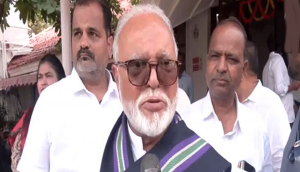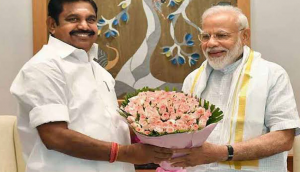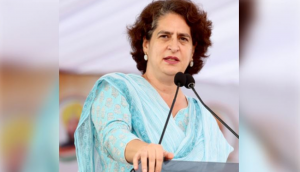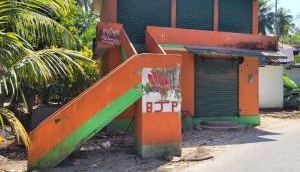Note ban raises moral questions against Modi. But he'll never appoint a Lokpal

A fiat issued by Prime Minister Narendra Modi on demonetisation on 29 November explains both the absence and importance of an ombudsman - a Lokpal - in national politics.
Through the fiat, Modi asked all his MPs and MLAs to submit their bank details from the day demonetisation was announced, 8 November, till the end of this year.
Also read- Why stop at BJP members' bank details? 5 other great things Modi can do
This farcical drill could have been a real, exemplary anti-corruption drive, were it conducted by a Lokpal.
And at a time when BJP has been accused of striking land deals in Bihar just before demonetisation was announced and of buying them by paying crores in cash, inquiries ordered and monitored by a Lokpal would have brought out the truth behind currency ban.
Remember, a Lokpal has jurisdiction over all Members of Parliament, and can refer cases directly to the Central Bureau of Investigation (CBI). This ombudsman could have asked all MPs, not just those from the BJP, to submit details of their bank transactions in the last six months.
But of course, there is no Lokpal in India, thanks to Modi. Neither is there likely to be one till his government completes its full term in 2019.
The govt's argument
The government has argued in the Supreme Court that since no party has the required 10% of the seats in the Lok Sabha to be eligible to appoint a Leader of the Opposition as per constitutional requirements, a Lokpal cannot be appointed.
The same government has amended Bills to modify the definition of the 'Leader of the Opposition', and appointed heads of the Central Vigilance Commission and the Central Information Commission. The process would be no different in the case of a Lokpal.
Former Solicitor General of India and ex-Karnataka Lokayukta N Santosh Hegde questioned the government's intentions.
"Why are they creating all this drama? Why not just close this department? The government in Karnataka first decided to do away with the Lokayukta's grievance redressal powers, and then decided to replace it altogether with an Anti-Corruption Bureau. It's a similar case with the Modi government as well," Hegde said.
"The idea behind Lokpal was mooted in 1964. Now, more than 50 years later, they are resisting the appointment of ombudsmen."
What Modi did in Gujarat
Resistance to an independent ombudsman is not something Modi hasn't shown before. As Chief Minister of Gujarat, Modi had into a bitter fight with then-Governor Kamla Beniwal over the appointment of a Lokayukta.
Since Modi dragged his feet on the matter, Beniwal went ahead and appointed a Lokayukta by herself.
Modi appealed against this decision unsuccessfully in the Gujarat High Court, followed by a successful appeal in the Supreme Court. In 2014, when Modi came to power at the Centre, Beniwal was transferred out of turn to Mizoram and, two months before her term got over, was unceremoniously sacked.
Modi's 'false sense of invincibility' was challenged by the Gujarat High Court. In his order on the appointment of a Lokayukta by Beniwal, Justice VM Sahai had said in January 2012: "The pranks of the Chief Minister...demonstrates deconstruction of our democracy, and the questionable conduct of stonewalling the appointment of ...Lokayukta threatened the rule of law. The refusal of the Chief Minister ...were deprave and truculent actions...The Chief Minister acted under a false impression that he could turn down the superiority and primacy of the opinion of the Chief Justice which was binding. The spiteful and challenging action demonstrates the false sense of invincibility."
Deja vu at the Supreme Court
About 10 days ago, Modi must've felt a sense of deja vu. The Supreme Court, hearing a plea filed by Prashant Bhushan, reprimanded the government for not appointing a Lokpal.
The Supreme Court Bench, on 23 November, told Mukul Rohatgi, the Attorney General: "It is a matter of concern that for the next coming years, till the present government is in power, there will be no Leader of the Opposition. We can't allow a situation where a law or an institution like Lokpal becomes redundant."
The bench sought a deadline from Rohatgi on when the institution would become functional. The bench asked him: "Was it not to be considered as an emergent situation by the government that despite the Lokpal Act becoming a reality in 2014, there is no Lokpal in place? If it is about cleansing the system, which you say this government is concerned about, then why in the last two years you could not make this work? We will not allow a situation where an institution like Lokpal becomes redundant."
Aversion to all forms of vigilance
Those who've observed Modi since his days as Chief Minister of Gujarat say this is the 'Gujarat Model' that he's brought to the Centre. They cite his historical aversion to all forms of vigilance to be the main reason why Modi would never allow the appointment of a Lokpal.
Petitioner Bhushan said: "Modi has destroyed accountability and institutions. He has tried to subvert judiciary and, as we've seen in the case of Gujarat, stalled the appointment of Lokayukta. Lokpal isn't the only thing; he hasn't notified the Whistle Blowers Protection Act either."
Bhushan added that, in fact, "Modi has diluted important anti-corruption legislations like Prevention of Corruption Act. He has systematically destroyed the RBI. Then there is the question over his appointment of the CVC. The only recourse left to challenge this destruction and subversion are the courts, to which we are appealing right now."
Edited by Shreyas Sharma
First published: 4 December 2016, 9:36 IST






![BJP's Kapil Mishra recreates Shankar Mahadevan’s ‘Breathless’ song to highlight Delhi pollution [WATCH] BJP's Kapil Mishra recreates Shankar Mahadevan’s ‘Breathless’ song to highlight Delhi pollution [WATCH]](https://images.catchnews.com/upload/2022/11/03/kapil-mishra_240884_300x172.png)

![Anupam Kher shares pictures of his toned body on 67th birthday [MUST SEE] Anupam Kher shares pictures of his toned body on 67th birthday [MUST SEE]](https://images.catchnews.com/upload/2022/03/07/Anupam_kher_231145_300x172.jpg)






